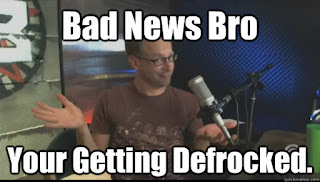I just listened to the news conference in Rome about the first session of the bishops meeting to deal with the abuse apocalypse in the Church.
I did not know the following:
The 1983 Code of Canon Law no longer uses the terms "laicization" or "reduced to the lay state" to describe a priest who is "defrocked" which is actually a Protestant term.
It speaks of a deacon, priest or bishop removed from the clerical state.
The term, "reduced to the lay state" is an insult to the laity, isn't it? And perpetuates the concept that priests are better than the laity because their punishment is to become a lay person again.
However, the terms laity and clergy are juridical terms of status in the Church. A priest who is removed from the clerical state is still a priest if he was validly ordained. And in fact in an emergency, a priest who removed from the clerical state can still hear confessions and offer the las rights, in particular the Sacrament of Extreme Unction.
There is nothing stopping a priest who has been removed from the clerical state from celebrating private Masses in his home. These Masses would be valid but illicit. But I doubt that the priest who is now no longer a member of the clergy could care less about what is licit or illicit.
On top of that, the Church cannot force a priest who is removed from the clergy to live under Church supervision or a life of penance. On the state can incarcerate or place on probation a person convicted of a crime. The Church has no authority over a priest who is no longer a member of the clergy, none whatsoever.
Did anyone know any of this or is it breaking news for you?

2 comments:
For some years, I've known that the term "defrocked" is not used by the Catholic Church. I think I have been generally aware that it is a Protestant term. For certain, I have known that the secular press commonly uses the term "defrocked" to describe a Catholic priest who has been removed.
Last week, my diocese released the names of priests who have been credibly charged with the sexual abuse of minors. Along with the names, the diocese provided the current status of each priest. Some priests had been suspended. Some had been removed. Some were dead, and so forth. The diocese provided definitions of the various terms and explained that certain priests, depending upon their specific status, would be entitled to continued support from the diocese, but they would continue to be under Church supervision. Others would not receive support from the diocese, nor would they be required to submit to Church supervision.
Reading that list was an educational experience for me, but the circumstances that led to the release of that information are tragic. What a terrible way to learn more about the governance of the Church.
As someone who left the active ministry, I always referred to my status as being "elevated to the lay state" !!! Your are so correct in noting that most of the terms used are very demeaning but I was not aware of the official change.
Post a Comment